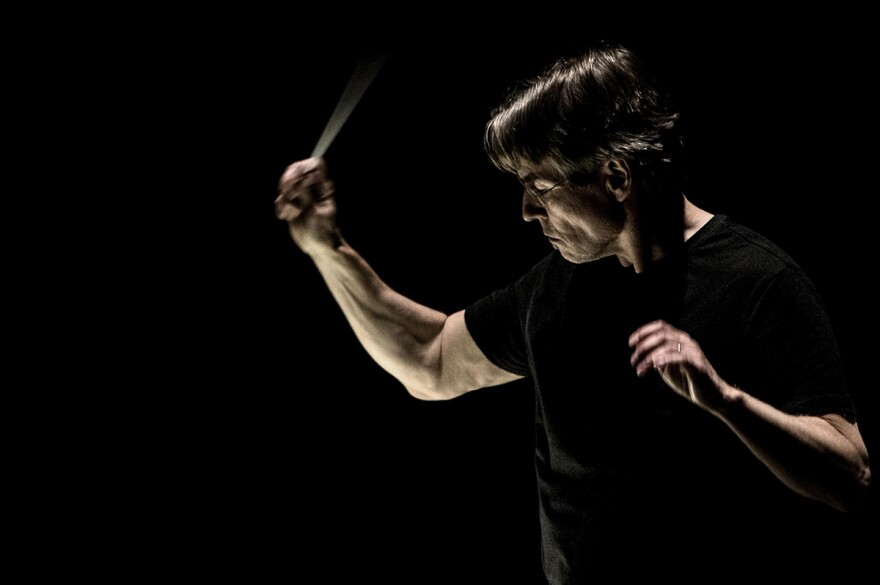Join us on Sunday, August 15th at 1 PM on WRTI 90.1, and Monday, August 16th at 7 PM on WRTI HD-2 to hear Esa Pekka-Salonen conduct The Philadelphia Orchestra in Richard Strauss’s tone poem Also sprach Zarathustra and two works by Béla Bartók – his Viola Concerto, with soloist C.J. Chang, and the pantomime ballet The Miraculous Mandarin.
The concert was orginally broadcast on WRTI in 2019.
This is a challenging program, directed by one of the world’s preeminent musicians. Richard Strauss himself conducted Also sprach Zarathustra with The Philadelphia Orchestra in 1921, on the second of his two visits to America. He based this bold tone poem on Friedrich Nietzsche’s brilliant, puzzling, and disturbing philosophical meditation.
The unforgettable opening, which depicts the sunrise viewed from a mountaintop, deploys the organ to magnificent effect, and hearing this iconic work performed with Verizon Hall’s Fred J. Cooper Memorial Organ sounding the opening chord is a special treat.

Nietzsche’s extraordinary book, written between 1883 and 1885, unfolds as an poetic narrative. It’s an elusive philosophical piece of literature, consisting of some eighty titled proclamations, each ending with the words “thus spake Zarathustra,” the Greek name for Zoroaster, the ancient Persian mystic. Strauss was deeply drawn to Nietzsche’s book, which is in various respects itself quite musical. Nietzsche, after all, was himself a musician and a composer, and some of his compositions can be found online. Strauss admired Nietzsche's musicality, and also understood his sense of irony.
Strauss prefaced the score with the opening of Nietzsche’s book, the Prologue, which recounts the 30-year-old Zarathustra leaving his homeland to philosophize in the solitude of a mountain cave. After ten years, he awakens one morning and addresses the rising sun, believing that he has achieved wisdom, and that it is time for him to descend to rejoin humanity.
Strauss brilliantly captures the Dawn in one of the most effective openings in all of orchestral music, with organ, double basses, and contrabassoon laying down a foundational pedal point—made only more famous after Stanley Kubrick used it in his 1968 film: 2001: A Space Odyssey.
When Béla Bartók died in September of 1945, he left a partially completed viola concerto commissioned by the violist William Primrose. And while no definitive version of the work exists, this concerto has become arguably the most-performed viola concerto in the world today.
After Bartók's passing, his family asked the composer's friend, Tibor Serly, to look over the sketches of the concerto and to prepare it for publication. Even though a draft was ready, it took Serly years to assemble the sketches into a complete piece. In 1949, Primrose finally unveiled it at a premiere performance with the Minneapolis Symphony Orchestra. For almost half a century, the Serly version enjoyed great popularity among the viola community, even while it faced charges of inauthenticity.
Then, in the 1990s, several revisions appeared and, in 1995, the composer's son, Peter Bartók, released a revision and a facsimile of the original manuscript, opening the way for an intensified debate on the authenticity of the multiple versions. This debate continues as violists and Bartók scholars seek the definitive version of this final work of Hungary's greatest composer.
This rebroadcast of Bartok’s Viola Concerto brings to the front of the Verizon Hall stage the Philadelphia Orchestra’s principal violist – Choong-Jin Chang, or, as he is familiarly known, CJ Chang. A native of Seoul, Korea, he made his performance debut as a 12-year-old violinist with the Seoul Philharmonic as winner of the grand prize in Korea’s Yook Young National Competition.
At age 13, he moved to the United States to attend the Juilliard School of Music. He subsequently studied in Philadelphia at the Esther Boyer College of Music of Temple University and at the Curtis Institute of Music, from which he received degrees in both violin and viola. His primary teachers were Jascha Brodsky and former Philadelphia Orchestra Principal Viola Joseph dePasquale. The Bartok Viola Concerto is a very important work to this wonderful violist, and his performance is not to be missed.
The Miraculous Mandarin is, quite frankly, one of the scariest pieces of music ever written. Both shockingly violent and erotic, Béla Bartók’s “pantomime grotesque” ballet was met with catcalls, stamping, and booing at its premiere in Cologne, Germany in 1926. The ballet’s plot, based on a story by Hungarian writer Melchior Lengyel, involves three thugs who exploit the seductive powers of a beautiful young woman to lure men into their den, where the victims are robbed. The thugs force the girl to stand in the window and dance provocatively. In Bartók’s score this seductive dance, musically depicted by the solo clarinet (and principal clarinet Ricardo Morales will do the honors), occurs three times.
The first two men who are lured into the trap are thrown out of the room when the thugs realize they have no money. Then, the exotic Mandarin enters. As the Mandarin is entertained by the girl’s dancing, the thugs rob him. They attempt to kill the Mandarin, smother him with a pillow and stab him, but to their horror he remains alive. Finally, when the thugs release the Mandarin, he embraces the beautiful young woman and, his longing fulfilled, he dies. There are moments when Bartók’s score evokes the unrelenting terror and sense of anticipation that one might feel while watching a horror movie. But there are also moments of irony and dark humor.
During intermission, WRTI’s Susan Lewis interviews Esa Pekka- Salonen, and the late Bliss Michelson talks with C.J. Chang.
Read the detailed program notes from the concert.
PROGRAM:
R. Strauss: Also sprach Zarathustra
INTERMISSION?
Bartok: Concerto for Viola and Orchestra
C.J. Chang, viola ??
Bartok: The Miraculous Mandarin??
The Philadelphia Orchestra
Esa-Pekka Salonen, conductor
Gregg Whiteside is producer and host of The Philadelphia Orchestra in Concert broadcasts, every Sunday at 1 pm on WRTI 90.1, streaming online at WRTI.org, and on the WRTI mobile app! Listen again on Mondays at 7 pm on WRTI HD-2.



